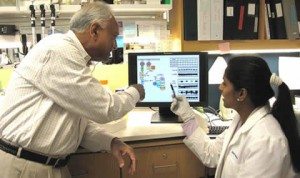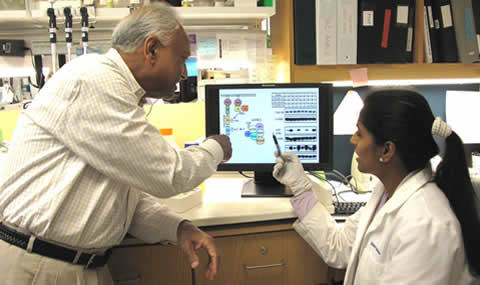Anil Agarwal, Shireesha Sankella work at UTSMC.
By Deepak Chitnis
WASHINGTON, DC: Two Indian American scientists at the University of Texas Southwestern Medical Center (UTSMC), Dr. Anil Agarwal and Dr. Shireesha Sankella, are at the head of a new study that may have found a new treatment for high blood sugar, which is an affliction of those suffering from Type-2 diabetes.

According to the study, the team led by Agarwal and Sankella isolated a type lipid molecule called phosphatidic acid, which is used to enhance glucose production and is found in the liver. This discovery was made in mice that were studied at UTSMC, where it was also found out that the production of the phosphadatic acid goes up as normal insulin production decreases. Therefore, the research team concluded that if the production of the acid was limited, high blood sugar could be controlled.
“This study establishes a role for phosphatidic acids in enhancing glucose production by the liver and identifies enzymes involved in the synthesis of phosphatidic acids as potential drug targets,” said Agarwal, Professor of Internal Medicine at the University of Texas. Agarwal is the study’s senior scientist, the full write-up of which will be featured in “The Journal of Biological Chemistry.”
Agarwal attended graduate school at Kanpur University in India, graduating in 1982. His research interests include “Functional aspects of acyltransferases, molecular aspects of lipodystrophy, [and] molecular aspects of premature aging.” He is a member of the editorial board for Molecular Nutrition and Food Research and the Journal of Clinical Endocrinology and Metabolism, and a member of the review panel for the American Journal of Physiology:Regulatory, Integrative, and Comparative Physiology. Additionally, he is a member of The Endocrine Society.
Sankella is a post-doctoral researcher in the lab of Dr. Abhimanyu Garg, a professor of internal medicine and associate program director at Dallas’ General Clinical Research Center; Garg was also part of the research team involved with the study. Sankella is part of the Division of Nutrition and Metabolic Diseases, where she “plans to test the inhibitors of diaclyglycerol kinase and phospholipase D in cultured cells and in animals to understand the molecular mechanisms for increased glucose production by phosphatidic acids in liver and cancer cells.
Type-2 diabetes is one of the most prevalent afflictions currently facing Americans, with roughly 25 million Americans suffering from it. Indian Americans, in particular, are statistically high when it comes to being at risk for or having the disease, along with ailments related to the heart and cardiovascular systems.
To contact the author, email to deepakchitnis@americanbazaaronline.com



